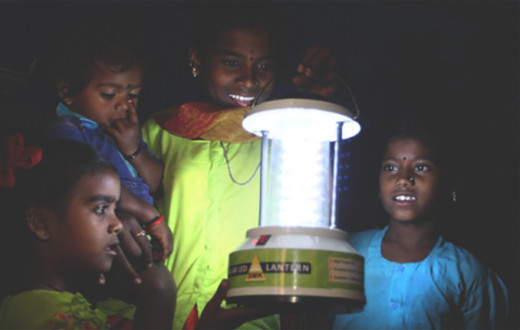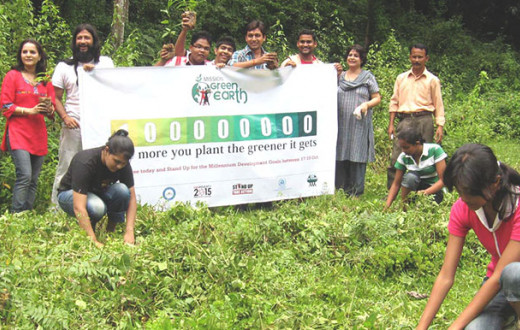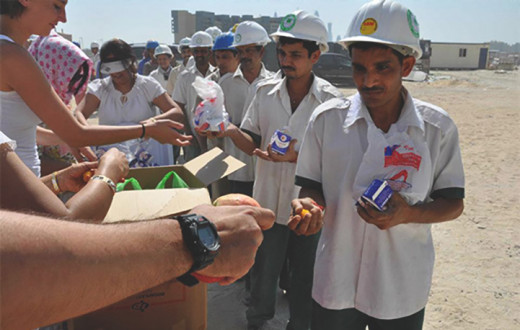Women, especially in rural regions, face challenges that are unique to them.
The Art of Living helps face these challenges and empowers women using three tools:
- Strengthening the individual
- Creating a sense of community
- Helping them find a cause to discover their own potential
A special focus is to empower women in rural communities. The rural woman is at the foundation of the rural community and our approach aims to nurture inner strength, creativity and self-esteem. Women can then become agents for peace and change for their families, the community, and society as a whole.
The Art of Living has been working in collaboration with various partners to create avenues for women empowerment that include increasing global awareness about women’s issues, creating economic empowerment and creating opportunities for women leaders to emerge.
Increasing global awareness
In partnership with the United Nations Population Fund, The Art of Living works to educate people against the practice of sex selection and female feticide in India. It runs a biannual Women’s Conference as a platform for women to discuss pertinent issues and create a renewed sense of enthusiasm about the difference they can make to the world.
Creating economic empowerment
To promote self-reliant communities, programs were started to engage rural women in income generation livelihood based activities. Rural women were trained in different skills like stitching, cutting, embroidery, beadwork, for jute bags. Agarbatti i.e. incense stick rolling provides another convenient and simple means for rural women to earn their livelihood.
Numerous Self Help Groups have been promoted in the fields of food processing, bag making, tailoring & embroidery.
The Vishalakshmi Cooperative Society – a women’s multi-purpose cooperative society been set up as a support mechanism. It has over 300 members hailing from the underprivileged background with dreams of business ideas. Under this project, various loans are dispersed to the members to facilitate self-employment at a low rate of interest.
Creating opportunities
Through its myriad service projects, opportunities have been created for women to emerge as leaders – be it prison programs, terrorist reformation, women’s issues, environmental causes, rural transformation.
Impact:
500 rural women
were trained in tailoring training centers established in Odisha and Assam.
Over 623 Self-Help Groups
formed in the areas of food processing, bag making, tailoring and embroidery.
5,000 rural women
in India trained in vocational skills
About 100,000 people
sensitized against pre-natal gender testing
About 150,000 people
sensitized against child marriage
Trained over 200 rural women
in agarbatti rolling (incense sticks) in villages surrounding the Art of Living International Center in Bangalore.
Bi-annual Women’s conference
hosted to bring together women from different walks of life.
Features Stories:
- India
- Iraq
- Zimbabwe
- Dharavi
- Women Taking Leadership
The VISTA project was started in 1985 near Bangalore to empower illiterate women, abused women and women in poor health. It provides vocational training in sewing and embroidery, while women are also taught literacy and informed about basic knowledge of health and hygiene. After the training, many take up employment with the local garment industry while others work from their homes to augment family income. Over 2000 women from thirty different villages have been trained through this program with multiple training units and a secure housing facility.
The Tailoring Training program provides women with vocational skills required to establish their own businesses and participate in the economic reconstruction of Iraq. The graduates of the program organize bazaars to showcase and sell items they created. The bazaars allow the women to profit from the products they have created, apply marketing and management skills they have learned in the training, engage in community outreach and further the empowerment of other women in their communities.
Around 60-80 women were trained in using a peanut butter machine so as to be able to increase their daily productivity over the manual methods earlier used. The women also learnt to package and market their peanut butter. This has helped many women gain confidence and achieve economic independence. For the first time, women have been able to afford their children’s school contribution and have inspired their husbands to support them by giving them land to grow peanuts.
Dharavi, the biggest slum in Asia in Mumbai, India: A CSR tie-up with Godrej initiated a beautician training centre in Dharavi in 2013 with 30 graduates. The trainings covered essential topics of beautician training, customer relationship, soft skills development and entrepreneurship and are conducted both in English and the local language. This center aims to train 240 women every year.
Graduates typically earn between INR 3000 to 5000 after the training creating a sense of self-esteem and confidence.
“Frankly speaking, I never thought I could start my own parlour. This training enabled me to do so and get financial independence. I am really glad I took this training” - Swati Sherkhane, mother of a two-year-old, started her own parlour.
“Working as a trainer to empower others has been the most fulfilling experience for me.” – Sandhya Gavali, a former student turned trainer who now supports her grandfather’s medical expenses.
Women Taking Leadership
In the village of Warwarhere in Maharashtra, The Art of Living introduced its rural development program – the 5H, in February 2001. As an outcome, 400 women in the village raised their voices and campaigned against addiction to alcohol and gutka, a preparation composed of betel nut, tobacco, catechu and other flavorings. Today in the village, alcohol has been banned, and domestic violence has reduced as a direct result.





